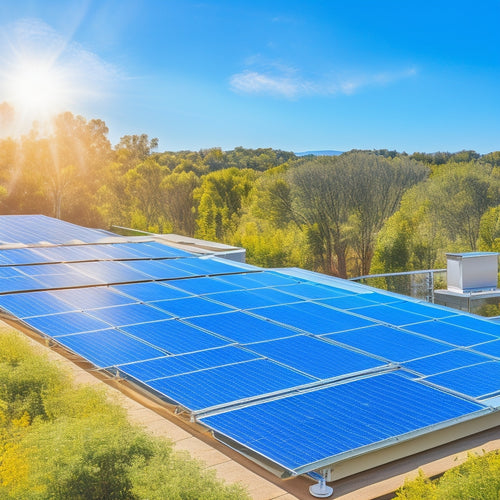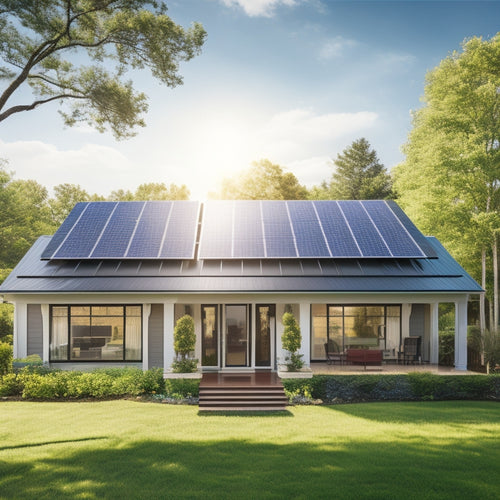
Home Power Battery Backup
Share
You can guarantee continuous power supply to essential appliances, lights, and communication devices during grid failures with a reliable home power battery backup system. This system provides a seamless power shift, detecting and prioritizing critical loads instantly. By calculating your total wattage requirements, you can identify essential appliances and prioritize their power supply, preventing food spoilage and electronics damage. With advanced inverters and energy efficiency features, you can optimize energy production and consumption. As you investigate the world of home power battery backup systems, you'll uncover more about how to maximize their benefits and tailor them to your specific needs.
The Essentials
- Home power battery backup systems provide reliable emergency energy during grid failures, prioritizing critical loads for seamless power transition.
- These systems ensure food safety and preservation by regulating temperature control and maintaining ideal storage conditions during outages.
- Integration with solar setups maximizes renewable energy usage, enhancing sustainability and efficiency in power management.
- Inverters convert DC power to AC power, regulating output to protect appliances from damage and ensure a stable supply.
- Calculating total wattage requirements and prioritizing essential appliances is crucial for effective power management during outages.
Reliable Power During Outages
You expect your home power battery backup system to provide reliable power during outages, and it should.
With a battery backup system, you'll have power on demand when the grid fails, ensuring your essential appliances stay operational. Additionally, it prevents food spoilage and maintains safety by keeping critical home systems, such as refrigeration and lighting, running smoothly Backup Power for Home Appliances.
This means you'll have a steady emergency energy source to keep your lights, refrigeration, and communication devices running until the grid is restored.
Power On Demand
During extended power outages, homeowners rely on their home power battery backup systems to provide reliable power on demand. This means you can enjoy uninterrupted access to essential appliances and devices, keeping your life running smoothly even when the grid fails.
With a smart energy system in place, you can rest easy that your power needs are being met sustainably and efficiently. By integrating a battery storage system into your solar setup, you'll reveal the full potential of renewable energy and create a more sustainable, dependable, and cost-effective power solution Solar Energy Storage Solutions.
Your home power battery backup system is designed to detect outages instantly and respond by providing power on demand. This seamless shift guarantees that your critical loads, such as refrigeration, lighting, and communication devices, remain operational.
You can configure your system to prioritize specific appliances, making certain that the most essential ones receive power first.
Emergency Energy Source
With the grid down, your home power battery backup system kicks into high gear, serving as a reliable emergency energy source to power your essential appliances and devices. This means you'll have uninterrupted access to vital systems like lights, refrigeration, and communication tools.
During an outage, your battery backup system seamlessly takes over, providing a stable and efficient flow of energy. By providing power outage protection, your system guarantees that you don't suffer from costly losses due to food spoilage and damage to electronics Backup Power Solutions.
Solar integration plays an important role in this process, as your battery backup system can capture excess energy generated by your solar panels during the day. This excess energy is stored in your batteries, providing a buffer against grid outages.
Effective battery maintenance is also fundamental to guarantee your emergency energy source remains reliable. Regular checks on battery health, charge cycles, and storage capacity help prevent unexpected failures.
Saves Food From Spoilage
You've invested in a home power battery backup to guarantee your family's comfort and safety during outages.
With reliable residential energy storage solutions like SimpliPhi Power and LG Chem RESU, you can have peace of mind knowing that your backup power system is efficient and effective.
Now, you can also rest assured that your fresh food will remain preserved, thanks to the reliable power supply that prevents spoilage.
With a home power battery backup, you're guaranteed to keep your perishable items fresh, even when the grid is down.
Fresh Food Preservation Guaranteed
Protect your fresh food from spoiling during power outages with a reliable home power battery backup system. You can maintain ideal food storage conditions, ensuring your perishables remain fresh and edible. A battery backup system provides energy efficiency, supporting sustainable practices in your kitchen.
By regulating temperature control, you can implement effective preservation techniques, keeping your food at the right temperature to prevent spoilage.
With a home power battery backup system, you'll enjoy improved kitchen organization, as you can store food without worrying about power outages. Eco-friendly options like this promote freshness maintenance, reducing food waste and supporting a more sustainable lifestyle.
When the grid goes down, your battery backup system kicks in, maintaining the perfect environment for your food. You'll have peace of mind knowing your food is safe and fresh, even during extended outages.
Prevents Spoilage During Outages
Spoilage is a major concern during power outages, as perishable items can quickly deteriorate without refrigeration. You risk losing hundreds of dollars' worth of groceries, not to mention the inconvenience of having to restock your fridge and freezer.
A home power battery backup system guarantees your fridge and freezer remain operational during outages, keeping your food at a safe temperature. This is especially important for households with family members who rely on medication that requires refrigeration.
| Type of Food | Safe Storage Time |
|---|---|
| Meat, poultry, fish | 4-6 hours |
| Dairy products | 4-6 hours |
| Fresh fruits and vegetables | 1-2 days |
| Canned goods | Indefinite |
With a battery backup system, you can enjoy energy efficiency and precise temperature control, assuring your food remains fresh and safe to consume. You'll have the freedom to live life uninterrupted, even during extended power outages.
Inverter Converts DC Power
You'll need an inverter to convert the DC power stored in your battery backup system to AC power, which is what most of your home's appliances use.
With top home battery backup systems like Generac and Tesla Powerwall, you can guarantee a reliable power supply during outages and natural disasters top home battery backup systems.
This conversion process is essential, as it enables you to power your devices and lights during an outage.
The inverter also regulates power output to guarantee a stable and safe supply of energy to your home.
DC to AC Conversion
Most home power battery backup systems rely on a significant component: the inverter, which converts DC power stored in batteries to AC power that can be used by your home's electrical grid.
This DC to AC conversion is fundamental, as most homes are wired for AC power. The inverter's primary function is to guarantee AC compatibility with your home's electrical system, allowing you to power appliances and devices seamlessly.
When selecting an inverter for your home power battery backup system, consider the type of DC applications you plan to support. Will you be powering lights, computers, or refrigeration units?
Different inverters are designed to handle specific DC voltage ranges, so it's important to choose one that matches your system's requirements. Additionally, look for an inverter with high efficiency ratings to minimize energy losses during the conversion process.
Power Output Regulation
As the inverter converts DC power to AC, it's essential to regulate the power output to secure a stable and consistent supply to your home's electrical grid.
This is where power output regulation comes in – a vital component of your home power battery backup system. You need to ascertain that the AC power output is synchronized with the grid frequency and voltage to prevent any disruptions or damage to your appliances.
Your inverter's power output regulation capabilities will determine the overall energy efficiency of your system.
Look for an inverter with advanced power management features that can optimize energy production and consumption. This includes adjustable power output, voltage regulation, and frequency synchronization.
These features will enable you to maximize your energy independence while minimizing energy waste.
Count Your Wattage Needs
You'll need to calculate your wattage requirements to verify your home power battery backup can support your vital appliances during an outage.
To do this, you'll need to take into account factors such as the type and number of devices, their individual power ratings, and the duration you want to keep them running.
When choosing a reliable energy storage system, it's crucial to take into account off grid solar batteries that can provide long-lasting and durable power.
Wattage Calculation Factors
Accuracy is key when determining your wattage needs for a home power battery backup system. You need to estimate your energy consumption accurately to guarantee you have enough power to support your essential appliances during an outage. To do this, you'll need to calculate your total wattage requirements.
Start by identifying the appliances you want to power during an outage. Then, find the wattage rating for each appliance, usually listed on the manufacturer's label or in the user manual. Be sure to account for startup surges, which can be higher than the running wattage. For example, a refrigerator may require 1,000 watts to start, but only 500 watts to run continuously.
When calculating your total wattage needs, consider the maximum number of appliances you'll be running simultaneously. This will give you your peak wattage requirement.
A good rule of thumb is to add 10-20% to your total wattage calculation to account for any unexpected energy draws.
With an accurate wattage estimation, you can confidently size your home power battery backup system to fulfill your energy consumption needs.
Essential Appliance Priorities
Identifying fundamental appliances is crucial in determining your wattage needs for a home power battery backup system.
You'll need to take into account which appliances you can't live without during an outage. Start by making a list of must-haves, such as refrigeration, lighting, and medical equipment.
Next, calculate the wattage required to power each appliance. This will help you determine the total wattage capacity your battery backup system needs to support.
When calculating wattage, take into account appliance compatibility and energy efficiency. Look for appliances with high energy efficiency ratings, as they'll reduce your overall energy consumption.
You may also want to think about upgrading to energy-efficient appliances, which can lower your wattage needs. Additionally, verify your battery backup system is compatible with your fundamental appliances to avoid any compatibility issues.
Longer Cycle Life Guaranteed
You're likely aware that a longer cycle life is essential for your home power battery backup system.
A confirmed longer cycle life means you can expect your batteries to last for thousands of charge/discharge cycles without significant capacity loss.
This extended battery durability guarantees your system remains efficient and effective over its lifespan.
Extended Battery Durability
Your home power battery backup system's longevity relies heavily on the durability of its batteries. To guarantee extended battery durability, it's vital to follow proper battery maintenance tips.
You can start by keeping your batteries in a cool, dry place, away from extreme temperatures and humidity. Regularly checking their state of charge and avoiding deep discharging will also help prolong their lifespan.
Implementing energy efficiency practices is another key aspect of extending battery durability. You can do this by optimizing your energy consumption, using energy-efficient appliances, and turning off devices when not in use.
This will reduce the load on your batteries, minimizing wear and tear. Additionally, consider upgrading to high-quality batteries designed for heavy-duty use, as they're built to last longer and perform more efficiently.
Frequently Asked Questions
Can I Use My Existing Electrical Panel With a Home Power Battery Backup?
You'll need to assess your existing panel's compatibility with a battery backup system, checking its capacity, wiring, and grounding to guarantee seamless integration; a professional evaluation will determine if upgrades are required for a hassle-free connection.
Are Whole-Home Battery Backup Systems Compatible With Solar Power?
You can achieve energy independence by integrating solar power with a whole-home battery system, allowing you to capture and store renewable energy for later use, reducing reliance on the grid and increasing your freedom from utility bills.
How Long Does It Take to Install a Home Power Battery Backup System?
When you decide to upgrade, the installation process typically takes 2-5 days, depending on the system's complexity and your home's electrical setup, ensuring ideal system efficiency, so you can enjoy reliable, grid-independent power and freedom from outages.
Can I Monitor My Home Power Battery Backup System Remotely?
Like having a sixth sense, you'll stay connected to your energy independence, as you can remotely monitor your system's performance, receiving real-time updates on battery management, ensuring your power stays on track, no matter where you are.
Are Home Power Battery Backup Systems Eligible for Government Incentives?
You're likely eligible for federal rebates and state incentives when installing energy storage systems, which can considerably reduce your upfront costs; however, specific eligibility requirements and incentive amounts vary depending on your location and system configuration.
Final Thoughts
You've made it to the end of our exploration of home power battery backup systems. Now, you know the truth: having a reliable power source during outages isn't just a luxury, it's a necessity. By investing in a battery backup system, you'll save food from spoilage and keep your lights on. With an inverter converting DC power to AC, you'll have the energy you need. Counting your wattage needs is essential, and choosing a system with a longer cycle life guarantee guarantees your investment pays off.
Related Posts
-

What Types of Solar Energy Devices Are Available
You'll find several types of solar energy devices available today, each customized to different energy needs. Photovo...
-

Home Solar Installation Cost
You're considering installing solar panels on your home, and the upfront cost is likely the biggest hurdle standing i...
-

High-Efficiency Solar Battery Chargers for Remote Areas
High-efficiency solar battery chargers are essential for your off-grid energy needs in remote areas. They maximize en...


